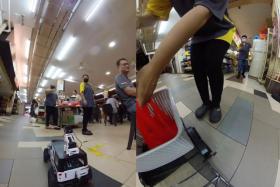How the workforce can adapt in the age of disruption
Businesses must invest in technology training today and upskill employees to prepare for tomorrow
Almost every generation faces a different wave of technology that reimagines the workforce.
But today, this force of technology is more formidable than ever.
From blockchain to artificial intelligence (AI), today's emerging technologies are completely changing the nature of transactions, the way we interact with each other, as well as how we learn from data - causing radical shifts across all industries.
According to recent ComtelPro research, approximately one in three (32 per cent) Singaporeans believe digital and technological change over the next five years could lead to potential job displacement.
Almost half of Singapore employees (48 per cent) also believe they need to adapt their current skills and experience in order to embrace digital and technological change over the next five years.
The stakes are high, and today's businesses need to look at adapting both their workforce and HR processes to not only leverage emerging technologies but also ensure their employees are prepared to receive and work with these technologies.
Today, business decision-makers recognise the pivotal role of smart technology to their organisation's future success.
For instance, blockchain as a public electronic ledger is widely acknowledged to be able to cut out middlemen, create transparency across supply chains and save on record-keeping costs.
In fact, Accenture claimed blockchain technology could net the world's largest investment banks up to US$12 billion (S$15.9 billion) in annual cost savings by reducing infrastructure costs.
This potential for innovation is exciting not only for companies but also employees.
POSITIVE IMPACT
ComtelPro's research showed Singapore employees are largely positive about the impact of emerging digital technologies on their current role, believing such technology will make their job easier to complete.
And 75 per cent of those in the finance and insurance industry believe blockchain technology will have a positive impact on their role in the next five years.
Employees are eager to learn. Nearly nine in 10 employees in Singapore say they would be interested in upskilling in the areas of emerging technology through their current employer.
Companies need to recognise that the embracing of emerging technology does not end at adoption of the technology itself but investment in their current workforce.
In Prime Minister Lee Hsien Loong's May Day Rally speech last year, he highlighted the importance of helping businesses advance and upgrade, while training workers to grow in their jobs.
Business leaders and HR professionals can do more to accelerate reskilling and tailoring existing roles and functions to embrace new technology.
This may include helping existing employees get up to speed and overcome any skill gaps, as well as putting in place programmes and working with third parties with technical expertise to enhance new employees' skill sets.
Providing training and up-skilling for employees can help companies prepare for tomorrow, but perhaps more importantly, it signals to a workforce the company is invested in them and their mutual progress.
Partnerships with educational institutions can also help attract the next generation of talent.
Companies need to act today or risk being left behind.
The writer is a director at Comtel and manages ComtelPro, which provides professional service offerings and purpose-built training to support businesses.
Get The New Paper on your phone with the free TNP app. Download from the Apple App Store or Google Play Store now


